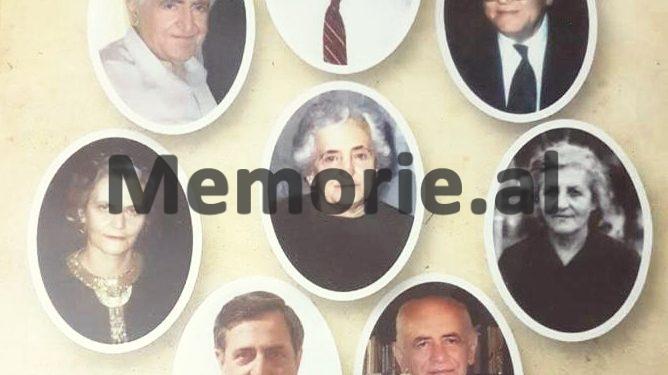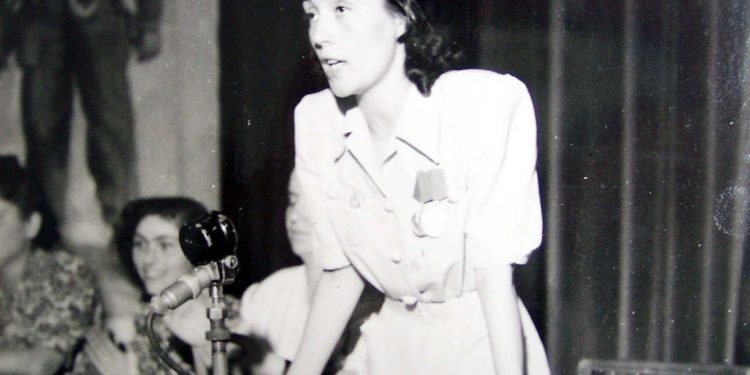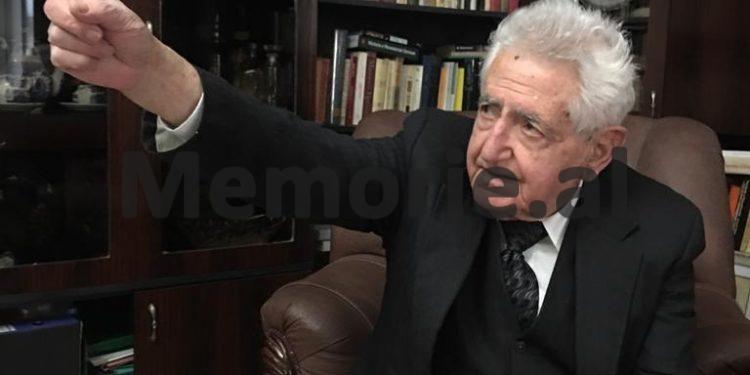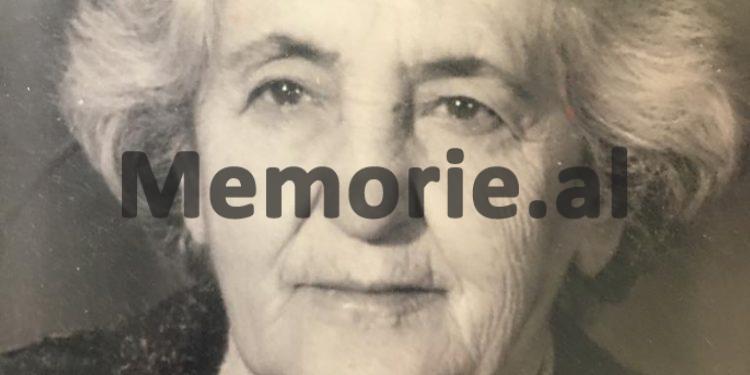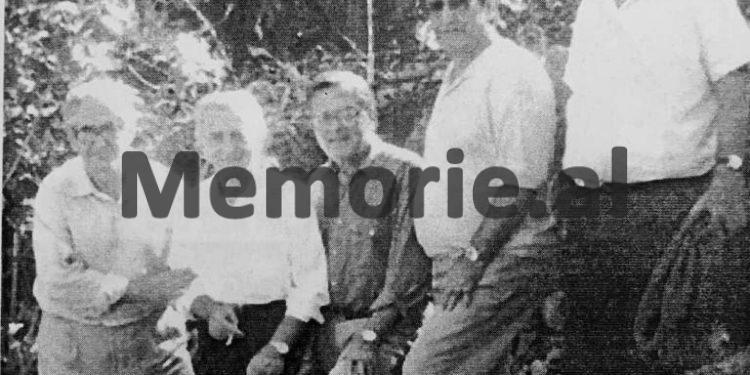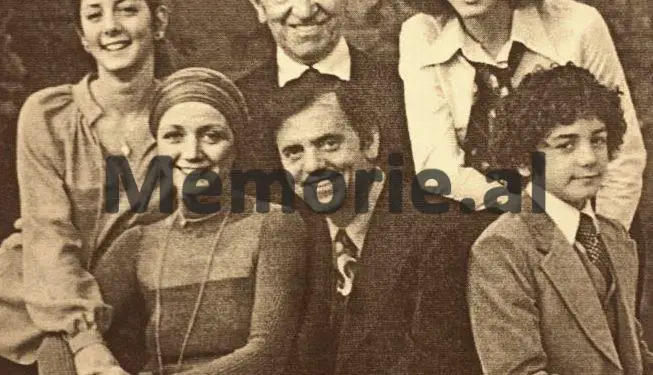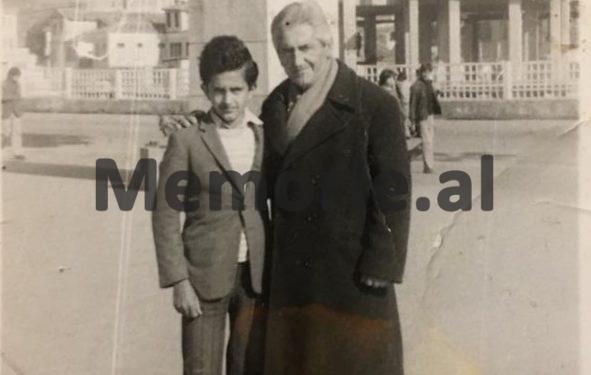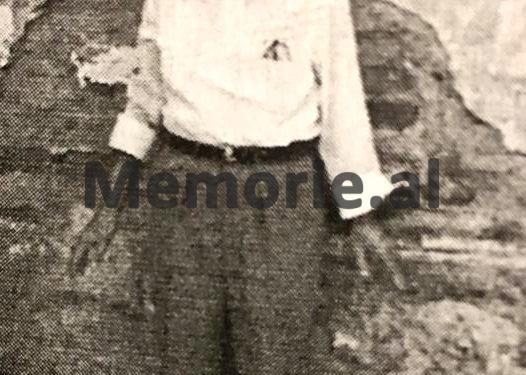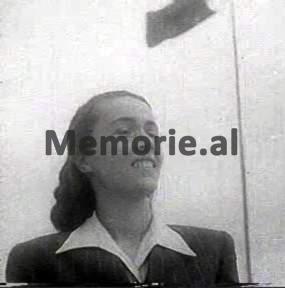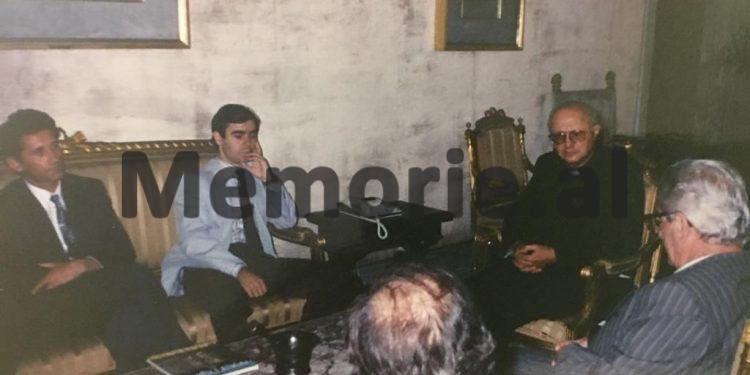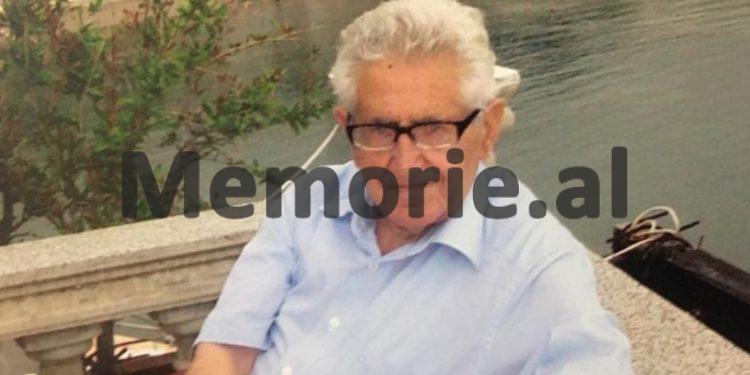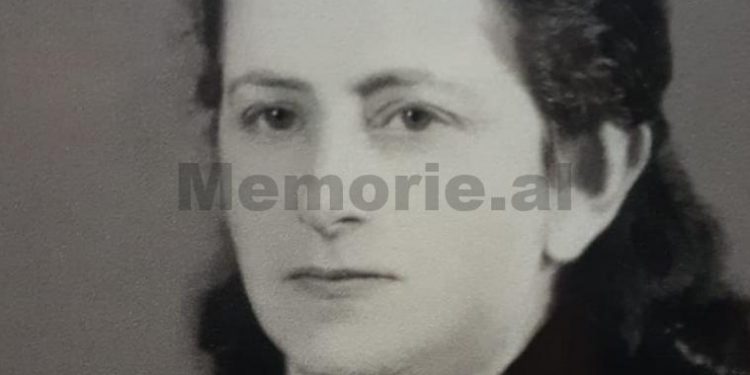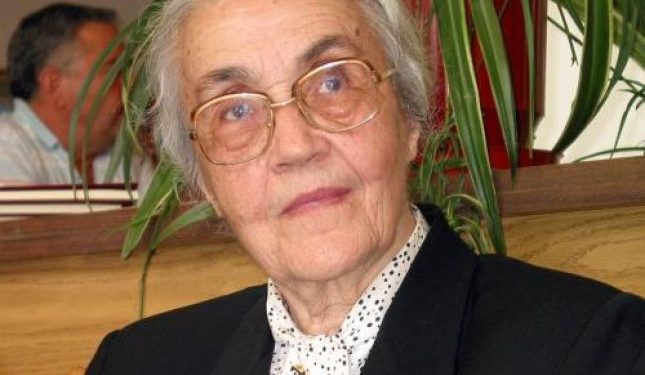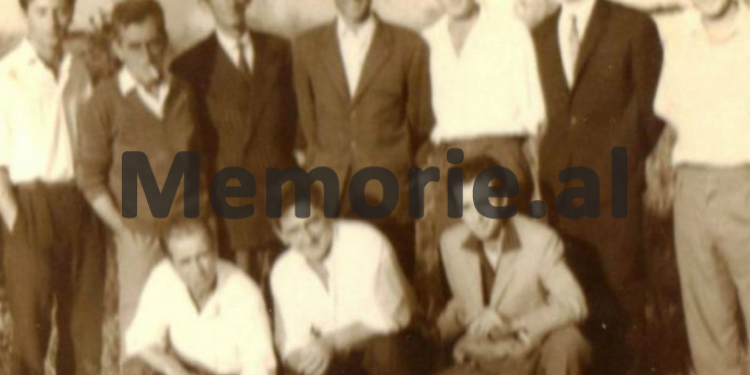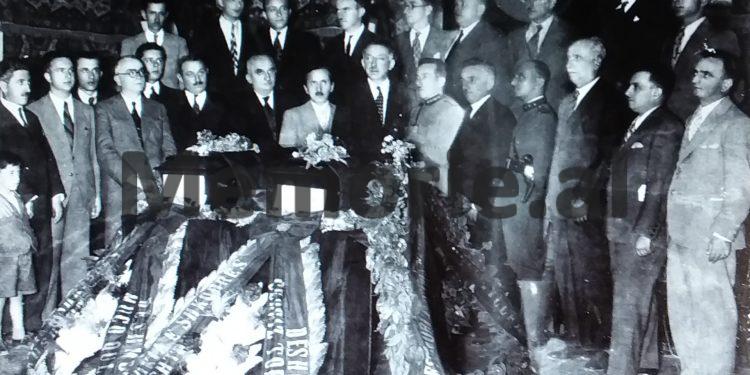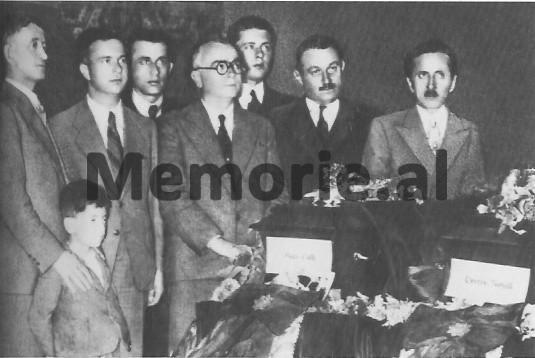Dashnor Kaloçi
Memorie.al publishes the obscure story of “Girls in Red Ribbons” which comes through rare testimonies of 90-year-old Tomorr Dosti, son of Hasan Dosti, former Minister of Justice in Mustafa Kruja’s government under Italian occupation and leader of the National Salvation Committee, which came out of the Mukje Conference, which left Albania with Mithat Frasheri in ’44 and settled in the US, where after Mithat’s death in 1949, he headed the Committee for many years. Free Albania ”backed by the US government, representing Albania at all the” Captive Peoples “Conventions held in Europe and the US.
The whole tragic story of the family of Hasan Dosti, the man who took Enver Hoxha in Shkodra in 1936 to pick up the remains of Cerciz Topulli and Muço Qull, while also reading his speech from the balcony of the Municipality of Shkodra, and for nearly seven years from the period of the Zog Monarchy and the occupation of the country, he kept in his home in Tirana, Nexhmije Hoxha, Nefo Puto Mufti and Naxhije Dumen, classmates of his daughter, Shanisha Dosti, for whom years later the movie “Girls with red cord” was realized!
How all Hasan Dosti’s children (five brothers and three sisters) suffered from prison and internment, from 1944 to 1991, starting with Shanisha, who after two years of university studies in Italy in the Department of Pharmacy, was exiled in 1945, working in the Municipality of Durres, and then ended up in the Kosovo Lushnja prison for five years for “agitation and propaganda”! Why she and her siblings never refused to seek the help of Nexhmije Hoxha, who in 1945, when a classmate unknowingly went to the office and asked her to do something for Shano, told that they were dying for bread, she replied, “Not dead yet,” and left them in prison and exile until 1991 ?!
In the mid-1970s, the former top leaders of the senior leadership of the APL began to think of their “wars, feats and heroism” during the “Anti-fascist National Liberation War” that they had until then. made public only in historical-themed books or in some literary work, they had already evoked and perpetuated them in the cinematic, as they knew and knew well the magic of cinema and its impact on the people. The impetus for this became one of the “old comrades” of the War, originally from Kurveleshi, who, in a conversation at the Party house after seeing a War-themed film, about one of the “Heroes of the People” frozen in face to face and as he laughed, he said to Enver: “We’ve been fight there too, not just these …”! So it was after the “Guerrilla Unit” and “Eighth in Bronze”, which had already been realized and aroused the jealousy of some “leadership companions”, that the film “Trails of War” was originally made for the story of Peza. Enver Hoxha was dissatisfied, as “the role of the Party did not work out well”, and in order not to stop the film, another thought was made and the movie “Decision” was made. In the meantime, “At the beginning of summer” was performed, which echoed the activity and activity of Hysni Kapo in Vlora Circuit, and a film was prepared for the Albanian Prime Minister, Mehmet Shehu, which was never produced because of the event that happened with the. Meanwhile, the historical themes in Albanian Cinematography continued with “Red Besa” (1982) and “Militant” (1984), where the activity of “friend Ramiz” during the Anti-fascist War was somewhat highlighted. Neither Nexhmije Hoxha, who had long contemplated and in the care of her “script” in 1978, “Girls with Red Ribbons”, in which “Red Ribbon Girls” was realized the activity and activity of some “friends” (wives of senior leaders), who from the period of King Zog Monarchy and Nazi-Fascist occupation of the country, had been boarding students at the Women’s Institute, “Nana Queen”, and under the “leadership” of his friend Nexhmije Junglin, had organized the first demonstrations and actions at the head of the Communist Youth. But unlike some films like “Guerrilla Unit”, “Eighth in Bronze”, “Early Summer”, “Decision”, “Militant”, “Red Besa”, etc., where there were some truths about the role of the “comrades of the leadership” during the Anti-Fascist National Liberation War, in “Girls in Red Ribbons”, the story seems to have turned “upside down”, distorting and manipulating everything!
First, before Nexhmije Hoxha was a “girl with a red ribbon”, she had been with a “black ribbon” as a member of the Fascist Party, which came out and became public only after the 1990s (from the former – Director of the Archive of the Ministry of Order, renowned historian, Kastriot Dervishi “), and secondly,” Miss Gajtani “the negative character in” Girls with Red Ribbons “, was not a spy girl as she loved and mourned, Nexhmije Hoxha, but one of her closest friends, for all the time they’ve been together at the Mother Queen’s Women’s Institute in Tirana, and quite the opposite of what is featured in that movie! She even not only never spied on her friends, the “girls with red ribbons”, but kept them with bread in her home, both during the period of the Zog Monarchy and during the occupation of the country, where even though they were “Communist youths”, she hosted them at her home where they held meetings, while her father was Minister of Justice in the then government. But who is “Miss Gajtani”, what is her story, where has she lived and why has her sad past been kept secret and shrouded in mystery for nearly eight decades ?!
In this exclusive interview with Memorie.al, Mr. Tomorr Dosti, son of Hasan Dosti, the former head of the Committee on National Defense who came out of the Mukje Conference in 1943, knows us in this exclusive interview. the main exponent of the nationalist organization, the National Front, which at the end of 1944 was forced to leave Albania by Enver Hoxha’s revenge, and settled in the US, where for many years he headed the Free Albania Committee. funded and supported by the US government.
While Mr Hasan Dosti was emigrating as a political asylum along with one of the boys, the other seven children remained in exile and in prisons from 1944 to 1991, although they were supposed to be “martyrs”, as their mother and wife of Hasan Dost were shot and killed by the Germans on November 16, 1944, along with his brother, Kutbi Dosti.
In connection with this sad and tragic story of their family, with Mr. Tomorr Dosti who is the brother of Shanisha Dosti, the “girl with red ribbons”, Nexhmije’s former close friend at the Women’s Institute, “Mother Queen”, we have talked since the early 1990s when he was a former deputy chairman of the Democratic Party and a member of the Albanian Parliament, and then he never wanted to make it public in the press.
Mr. Dosti, now in his 90s, with an enviable health and memory, has preferred to remain silent as has been their family for three decades, which has been and continues to be “Mecca” where all former persecuted and political prisoners of Albania have been “pardoned” since the fall of the communist regime.
But this was only possible after our long insistence, and after some meetings with Mr. Dosti, in those days that his brother Ernest (the last one still living) was separated from his life, and this is also the case with the latest book of Nexhmije Hoxha, which has been followed by almost all the written press for days. and various online media.
follows from the previous number
What was the economic situation of your family in those years?
The fact that we were in rented houses and never had a home in Tirana, even though my father was in high office in the High Court, or later as a Minister, shows the worst of our economic situation. We were in a bad economic situation and only lived on the salary of our father and uncle, who sacrificed and did not create a family, just to help us when we were eight children.
And despite that, did your sister’s friends wait and follow her regularly …?
Most definitely and with the greatest pleasure as they, like Nefo, Nexhmia, Xhorxhina, etc., were like the daughters of the house. I remember Ana, (as we called our mother), when the girls were coming home at the end of the week, she said to her brother, “Tori, our oil is gone, so what are we going to cook for our girls today …” ?! So that was the situation in our house.
How long did your father Hasan stay in the post of Minister and why did he leave?
The father remained in the post of Minister of Justice for three to four months, and during that time he was able to save some exponents of the Communist Movement, such as Hasan Reçi, Sinan Gjoni, and others from the death. At the end of May ’42, the father resigned from the post of Minister of Justice, after refusing to sign for the firing of the communists Nikolla Tupe, Ferit Xhajko and Hamdi Mezezi, who were captured by the Italian authorities while traveling in a car on it. exit to Fier. He resigned after disagreeing with the capital punishment imposed on three of the six Communists operating in Fier. The three of them agreed to be pardoned by Prime Minister Mustafa Kruja, but Hasan, along with Jup Kazazi, insisted and insisted that everyone’s life be forgiven. And after that didn’t happen, he stepped down and resigned.
Where did the father then work?
In 1942, with the opening of the Albanian Institute of Scientific Studies (headed by Pat Anton Harapi) Hasan was appointed Vice President for Historical Studies along with Alexander Xhuvani (for Literature) and Odhise Paskali (for Arts).
Returning to your family’s connections to Nexhmije Hoxha, when might she have last come to your home?
But it is certain that she came from 1942, when Sister Shano had not yet gone to Italy for study, let alone later.
What happened to your family after the end of the War, and what attitude did Najmiyah and Nefo and other friends have toward you as a family and personally to your sister Shanos?
Ending the War proved to be no worse for our family. His father, Hasani, given the functions and commitments he had during the War, namely: as Minister of Justice, Chairman of the National Salvation Committee at the Mukje Meeting, was forced to leave Albania in November 1944. He took with him and The lion, brother (who is behind Victor and before me), and left the house without ending the War in Tirana, sometime from the beginning of November, and on November 25 they left Albania through Shkodra to Montenegro, with exponents other nationalists. But while Luan’s father had left home, the last day German forces left Tirana, they killed our mother, (Anea), and uncle, Kutbi, an event that is now publicly known.
Let us return briefly to that, how and why did it happen?
By the end of 1944, we had moved from our home to Count Urani Street and lived in the house of Agah Libohova, as he was a close friend of our father’s and we did not pay rent there. For the last four days before the liberation of Tirana, that is, from 15,16 and 17, on Kavaja Street where we resided, the withdrawal of German convoys coming from Elbasan Street continued to the North. On that day, the last day they were leaving, on November 16, someone, a partisan who was hiding in the buildings near the house where we lived, shot the Germans who were retreating and they went down and searched, in some houses they came from the bullets that shot them. And in retaliation as they had the law of war, they retaliated by entering some of the houses in that neighborhood, like us, where they shot their mother and uncle, Kutbi. Likewise, the bullets and fire that hit the house wounded her arm and sister, Veronica, and were slightly burnt as she attempted to leave the house, as did Brother Victor, whom the Germans had originally intended to fire. It was all a big disaster that precisely in the last moments when the Germans were leaving Tirana and their uncle’s mother we buried them in the backyard first, as it was not known how long the war would last.
What happened to your family in the days that followed?
Left without parents, we were left as bad as possible and scattered wherever we could to our people, since we were children of Hasan Dosti, ordered us to leave Tirana and settle in Durres. There we were housed by Esat Derrasa, (a father’s relative from Gjirokastra), who released us a barrack where we housed all six brothers and sisters, as I told you, Luani had left with my father.
Before I ask you how your family’s life under the Communist regime went, when your father, Hasan, learned that his wife and brother, Kutbi, had been killed?
My father learned this news a few months later while in camp in Italy, where one of his close friends comforted him by telling him the story … (tears).
Back to you, then the four brothers and three sisters you went to Durres, what happened to you then?
Since 1945, they have arrested his brother, Victor, along with some of his friends, and convicted them of agitation and propaganda. and Victor served five years in prison. Due to the difficult economic situation, as we were without any income, I went to Gjirokastra with some relatives of my father. Others continued to reside in Durres, living only on a small wage earning a large sister, Shano, a laborer at the Durres Municipal Enterprise. They were in such a state that they could not even secure their bread.
Given this situation where you were at the time, did you ever think of seeking help from Nexhmije Hoxha, or Nefo Mufti who had already occupied high positions in that power…?
We, as brothers and sisters, have never talked to each other, and normally we haven’t even gone in, as we would have talked.
Did Nexhmija know anything, so was she aware of the situation where your family was, the loss of your mother and uncle, or the imprisonment of Viktor and the others who had you removed from Tirana…?
Yes. Nexhmija knew all that had happened in our family and the difficult economic situation we were in, after telling her in detail, one of her friends and our sister also, Polixen, (originally from Saranda, the surname I can’t remember now), who, without telling anyone, had gone out and met Nexhmije in her Tirana office. After telling her, even though Najmiyah had waited a while when she opened the conversation for our family, Polixeni finally told her: What can you do about Shanon dying of bread after her mother and uncle were killed? Germans?
What was Nexhmija’s answer?
You won’t believe it, but she just said these words explicitly: “It’s not dead yet. I don’t even want to know about her because she betrayed us ”? This was Nexhmije’s response that Polixen brought to us through a relative of our family.
What treachery did Nexhmija mean?
But what a betrayal! … here’s what her father Hasan sent Shano to study in Italy and that she didn’t come up with a partisan mountain like them!
In your opinion, could Nexhmija help you when you knew what was the name of Hasan Dosti at the time for the communist regime?
There was no word to help us, nor did we ask for help, which Polixen had explained to her, so she had told Nexhmija that she had gone unknowingly, but was doing so based on the fact that Shannon had had them. close friends and had stayed in our home for several years as in their home.
When they told Nexhmija the answer, how did your sister, Shano, react?
Surprisingly, he was not impressed and said only these words: “I never thought that Nexhmija would become so ferocious”!
But in the years that followed when it came to Nexhmija, what did Shano say?
Not to mention that we never mentioned Nexhmija, as it was known that it could pose a danger to us, that our words could be transformed, in the rare instance we may have mentioned when we were in exile, Shano did not say a word. other than what he once said: So he never thought that Nexhmija would become so ferocious ?!
But besides Nexhmije, Enver Hoxha, or more precisely your father, Hasani, has known you as a family, since in 1936 Enver was in Shkodra to receive the remains of Cerçiz Topulli and Muço Qulli!
Yes it is a known fact that Enver knew us, but what is never said is the fact that my father, Hasan, included him in the delegation that went to Shkodra to pick up the remains of two great patriots, Cerciz Topulli and Muço Qulli. At that time I was six apart and my father took me to Shkodra and was present at all the ceremonies that took place there. That event is fixed in some photos where only in one, is the picture where Enver and I came out near us…! (Mr. Dosti shows us a picture we are publishing in this article)
Specifically how this event happened where Enver besides this picture you are telling us, there is another one where he is giving a speech on the balcony of the Municipality of Shkodra. Do you remember this event and the speech Enver gave, as it is already known that this picture on the City Hall balcony is retouched?
I remember it very well and it is very true that Enver spoke there on behalf of the “Gjirokastra Djemuria”, but Enver gave the speech that my father, Hasan, had prepared to deliver on his own, after my father became ill and that speech that had prepared, he gave Enver, that he was the youngest in all that delegation.
But what else do you remember from that event, did Enver talk to Hasan?
I can’t tell you specifically, since I was little and this event happened 84 years ago, but they normally talked to each other. And what Enver gave his father’s talk, I learned some years later, specifically from the last period of the War, from the fall of 1944, shortly before my father left Albania, in the conversations that were taking place in our home. I even remember that they mentioned my name, saying that they had sent me to call Enver when the father with those of his friends, such as the Prefect of Shkodra, Javer Bey Hurshiti, Daut Çarçani, etc., decided that Enver would read the speech, like the youngest of the delegation.
What else do you remember about Enver?
The concrete conversation is not remembered, but I remember when we went there to the Addition Field where the remains of Cerciz Topulli and Muço Qulli were buried, Enver always held me by the hand. I remember this very well, but I do not recall his conversations with members of the delegation. But I do not believe it would be Enver’s turn to talk to those who were personalities, such as ministers, deputies, mayors, etc.
Returning to your period in Durres, how long did you stay there?
We stayed in Durres until 1949, when after hitting the “Koci Xoxes Group”, Shano and I were allowed to work in education. I took a course and was appointed a teacher in the villages of Tepelena, and Shano, after two years of university in Italy (for a pharmacy), did not take a course, but went in as a teacher. But this work, lasted only a few months, so less than a year and we were not only fired, but also removed from Durres.
What happened, when you re wipet out ?
At the time, Mehmet Shehu as Minister of Internal Affairs had given a speech criticizing the Ministry of Education, saying it had reduced the burden of allowing Hasan Dosti’s children to work in education. That’s what it took and we got rid of it.
Who had actually helped you get started in education and where did they send you after?
In fact, we were helped by Kadri Baboçi, the Deputy Minister of Education, with whom we had lunch. After we were removed from Durres, I spent some time in Fier, with some of my father’s relatives, and my three sisters and three brothers (Leka, Ernest and Viktor, who was released from prison in 1950, were interned in Gradishta, Lushnja). She stayed there for a short time, after being interned again in Kuç of Vlora and then in Porto Palermo. In 1951, Shanon’s sister was allowed to come to Tirana, where she worked again in the Communal, as a laborer. They removed him again from work and from Tirana, bringing him into exile in Gradiste, where they also brought Victor from Porto Palermo.
How long did you stay in Gradishtë ?
Until 1953, I was with Lekë who took us to Tirana in Genjo, and when we had spent 9 months in the army, they arrested us and after spending some time in the investigator, they sentenced us to 25 years in prison on charges of “agitation and propaganda and attempted escape. ” With us was a friend of ours who was sentenced to 20 years.
Were the allegations made against you?
We could have expressed some dissatisfaction, but we had made no escape plan and everything was mounted, simply that we should be condemned as the sons of Hasan Dosti, who since 1949, after the death of Mithat Frasheri, was the chairman of The “Free Albania” Committee in the US, where she had a very active life in politics, such as representing Albania at the “Captive Peoples” congresses held from time to time in various countries such as US Europe. So everything that happened to us was pressured by my father so that he would not engage in politics and “hostile activity” against Albania. Even when we were in Burrel Prison, they came to us from Tirana and asked us to write a letter to Hasan not to deal with politics, but we refused and they left without asking us too much.
Where did you serve your sentence and when you were released from prison?
I was released from prison on July 9, 1967 after earning amnesty and a year in prison. Leka was released a year after me, and we both went back to Gradishte. But while we were in prison, in 1960 a sister, Shano, was also arrested in Gradiste, who was sentenced to five years in prison for agitation and propaganda.
What happened that they condemned …?
Everything was fabricated, and I even remember that some people from our tribal district said that Shanos had been found by the State Security, a radio transmitter that had hidden him in a tree, where he would go at night and communicate with his father and brother, in the USA. These were legends spread by State Security and the poor people believed them, or simply conveyed them as they heard them.
But without getting out of prison, how did Shano’s life come about?
Shano was released from the Kosovo Lushnja prison in 1965 and after spending several years in exile in Gradiste where he met and married Ibrahim Sokoli (brother of renowned professor and ethnomusicologist, Ramadan Sokoli), who returned to internment after being in prison for several years, with his father, Yusuf, Ramadan, and brother, Hodo Sokoli, who was released late when the communist regime was overthrown. Ibrahim, after completing his internment, was allowed to return to Shkodra with Shanon, where they both worked again as municipal workers.
How long did Shano live with Ibrahim?
Ibrahim passed away in 1997 in Shkodra and after his death, Shano returned to us here in Tirana, after they were married to an elderly man and had no children. With the money he sold his house in Shkodra, Shano made this library that we have here, because at that time our father’s books came from the US. Shano passed away in July 1999.
What about the other two sisters, Tefta with Veronica, creating families?
The two married in exile, Veronika, with the son of former Albanian Prime Minister Fiqiri Dines, and Tefta’s husband was from Gjirokastra.
What about Victor with Leka and Nesti?
Victor married and made an interning family with Abaz Kupi’s daughter, Hyrije, a real lady whom we respected as the first of our house even after Victor’s death, until the day he died a few months ago. Even Ernest who passed away only three weeks ago, created families in exile, while Leka who passed away a few years ago could not create a family, as he went to prison and internment.
How long did the rest of you stay in exile and when did you return to Tirana ?
We have been in exile until 1991 when the Communist regime collapsed, but we stayed there a few months longer as we had nowhere to go, as our father, Hasan, never had a home of his own and always lived in rent. Given this fact, when we arrived in Tirana, with securities and reparations from prisons and internments, we privatized this warehouse by adapting it for housing where all four brothers and three sisters gathered with our families.
And how long did Father and Luani live?
The father passed away in January 1991, at the age of 96, in the US, after learning that the communist regime in Albania was in the throes. Luani lived another year, but he came to Albania and we were lucky enough to meet and appreciate each other. Only in 1991 did the five brothers and sisters get together, because since ’45, we didn’t have to meet everyone, as one came out of prison, the other went in.
Even before you were in exile in the 1990s, did you know or know where his father was, Hasan and his brother, Luan?
We had truncated and half-truthful information, as where we were interning it was very difficult to find and communicate with people who might know something about their fate. But as his father lived, we learned from Enver Hoxha’s speeches and writings, as he mentioned it often, while on the contrary, his father and Luani had information about us, from Albanians fleeing and heading west.
But after the ’90s, Nexhmije Hoxha, or any of Shano’s ex-friends, were there any signs of conscience, we are saying, or regret, of what had happened to you?
When Luani died in 1992, one of Shano’s ex-friends had told Nefo Myfti to come to us for comfort, but Nefo had replied, “We have no face to go to Shano and Friends for comfort, for what have we done to them”. And Nexhmijen has been met by our brother, Victor, since 1993 when she was in the Tirana prison, since Victoria at the time, together with Arben Puto, was in charge of the Helsinki Committee (Committee for the Protection of Freedoms and Human Rights) for Albania.
How was the meeting between them and what did they talk about?
Viktor and his colleagues from the Helsinki Committee went there to see the conditions of their prison and their treatment, following several complaints made in writing by former detained blockers to both foreign journalists and the Committee to Protect Freedoms and Human Rights. When they entered the room of Nexhmija, she recognized him and asked, “Tori art thou”? So you ran like an old acquaintance, you’re by the name of Victor, but in short, Tori!
How did Victor respond?
But what could Victor tell him, he replied as if he had an old acquaintance who had done us only “good”, saying with a smile; “Yes I am, but how do you know me”? And Nexhmija told him that he had known her by voice and added: “Do you remember when Ana said, Tori, we are running out of oil, the girls will come and we have nothing to cook for them ”?! And at the end of their brief conversation she seems to have comforted him over the death of his brother, Luani.
What about Shano, he said nothing?
Absolutely no word, it seems, and Nexhmija continued to regard Shano as a traitor.
Memorie.al




